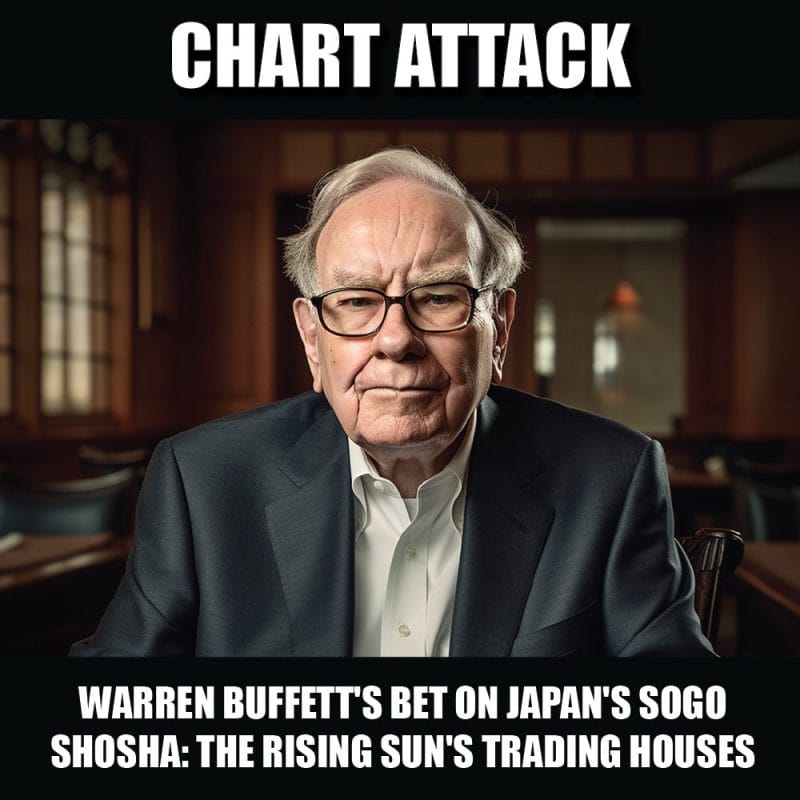Warren Buffett, the “Oracle of Omaha” and CEO of Berkshire Hathaway, has recently raised eyebrows with his decision to increase his stakes in five major Japanese trading houses known as the Sogo Shosha. During a recent interview with CNBC, Buffett expressed his fascination with the opportunity, stating that the earnings yield of these companies, in combination with their low cost, was irresistible. Buffett’s investment in the firms has already grown to 7.4%, and he has hinted at further investments in the future.
Vishal Toora’s analysis of Warren Buffett’s recent investment in Japan provides an insightful look into the dynamics of the Japanese market and the potential impact of these investments. Notably, Vishal discusses the underlying economic factors, such as the Bank of Japan’s continued dovish stance on monetary policy and the potential for the Japanese yen to take a hit.
Vishal points out that Buffett’s investment in Japan isn’t surprising given his reputation as a value investor. He quotes Buffett, “I feel more comfortable holding Japanese assets than assets in Taiwan.” Buffett’s preference for Japan seems to be tied to the country’s stable business culture and consistent dividends, which Vishal highlights as a hallmark of value investing. Some have also interpreted Buffet’s move as a vote of non-confidence in an uncertain American economy for at least over the near term.
Vishal further discusses Buffett’s investments in Itochu Corp., Marubeni Corp., Mitsubishi Corp., Mitsui, and Sumitomo. These companies, he explains, are involved in a wide array of businesses ranging from energy to food, healthcare, and even real estate, aerospace, and emerging sectors like EVs and renewable energy.
The companies in question are known as Sogo Shosha, a term which refers to the general trading companies that have been a cornerstone of the Japanese economy since before World War II. These firms, including Mitsubishi Corp., Mitsui & Co., Itochu Corp., Marubeni, and Sumitomo, have a vast presence in the B2B sector. These Sogo Shosha firms are critical for anyone considering entering the Japanese market.
Understanding Sogo Shosha
The Sogo Shosha model is unique to Japan and is unlike any other “trading company” business model in the world. While other nations have trading companies, none possess the unique structure and operations of Japan’s Sogo Shosha. The term is often used to describe wholesalers engaged in trade and international transactions, but in Japan, it signifies much more. The Japanese Sogo Shosha companies have a deep involvement in domestic transactions, with about 60% of the transaction value being domestic.
Origins of Sogo Shosha
Japanese Sogo Shosha companies can trace their roots back to the end of the Edo period. The first private trading company in Nagasaki, Kameyama Shachu (later Kaientai), established in 1865 by Ryoma Sakamoto, is often considered the predecessor of modern Sogo Shosha.
Types of Sogo Shosha
There are many different types of Sogo Shosha companies, but they can broadly be classified into general Sogo Shosha and specialized Sogo Shosha. The specialized trading houses focus either on a specific region, like Europe, ASEAN, or the Middle East, or a specific business category, such as food, fashion, or metals.
Unique Business Model
Sogo Shosha has a unique business model. They are involved in various functions, ranging from hardware to software, urban redevelopment, social infrastructure development, IT solution implementation services, and even licensing of fashion brands. They have a financial function, utilizing their vast resources to invest and participate in the management of companies as needed.
Main Business Operations
Sogo Shosha companies primarily operate two types of businesses: trading and business investment. The trading business involves handling commercial products such as raw materials, goods, and services, and earning commissions by acting as an intermediary between sellers and buyers. They deal in a wide range of products, from energy to textiles, and also provide value-added services such as finance and insurance in trading. On the other hand, business investment involves investing in promising companies and earning profits through dividends.
Buffett’s investments in these firms underline the global impact and potential of these Japanese giants. With his plan to hold these investments for 10 to 20 years, and Berkshire Hathaway’s interest in further deal-making opportunities, it appears that Buffett’s bet on Japan’s Sogo Shosha could lead to a fascinating period of growth and partnership. For anyone considering entering the Japanese market or investing in Japanese stocks, understanding the unique model and influence of Sogo Shosha is critical.

